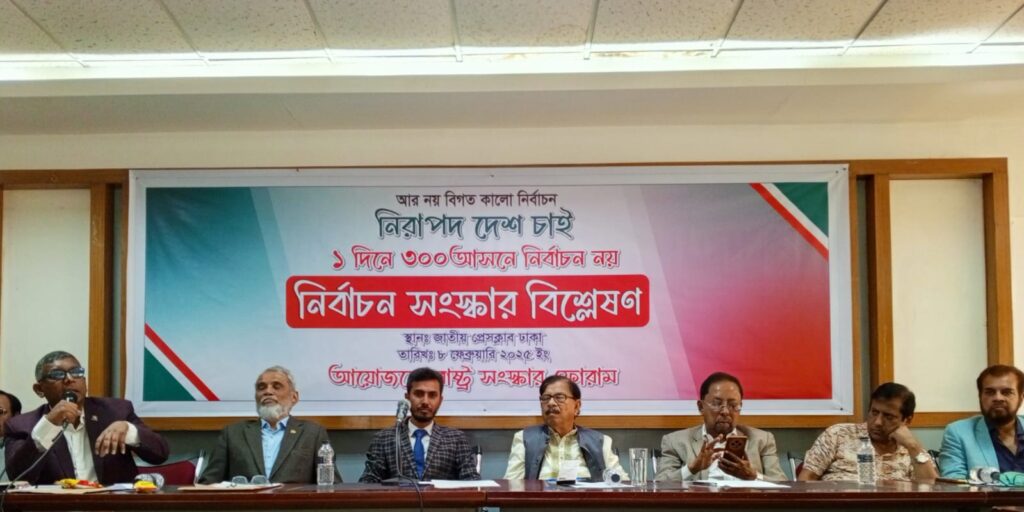The president is elected by direct popular vote.
On the day of the parliamentary election, two separate ballot papers
Two votes for the presidency and for members of parliament.
On Saturday morning, February 8, a discussion meeting titled "Election Reform Analysis" was held at the Tafazzal Hossain Manik Mia Hall of the National Press Club under the slogan "No to 300 seats in one day" under the initiative of the State Reform Forum.
The event was chaired by Nurul Quader Sohel, the chief coordinator of the State Reform Forum, and was attended by Mahmudur Rahman Manna, former VP of DUCSU and president of Nagorik Oikya. Other speakers included Lieutenant General Aminul Karim (retd), former state minister Golam Sarwar Milon, chairman of Nirapar Sarak Chai and film actor Ilias Kanchan, Lieutenant General Md. Nazim Uddin (retd), and former senior vice-president of the Supreme Court Bar Association ABM Waliur Rahman Khan.
During the discussion, speakers raised several demands, citing various sections of the Election Reform Commission's report and obstacles to a smooth implementation. These include:
1. The President forms a search committee consisting of 5 people from different professions.
2. In order to keep the formation of a completely independent Election Commission free from government interference, the Election Commission Secretary will be appointed through promotion from the Election Commission Division or appointed by the Commission.
3. The District Election Officer will serve as the District Returning Officer and the Upazila Election Officer as the Assistant Returning Officer. The Deputy Commissioner and Upazila Executive Officer will be kept completely exempt from the election.
4. If the schedule is announced, during the election period, all the officials except the District Commissioner in the case of districts will be subordinate to the District Election Officer, and in the case of upazilas, all the officials of the upazila except the Upazila Nirbahi Officer will be subordinate to the Upazila Officer.
5. For the sake of elections, the District Election Officer can transfer any officer of any upazila under the district.
6. If an officer who will be responsible for the election has been working in an upazila for three years, he must be transferred to another upazila. However, if necessary for special family reasons, the Deputy Commissioner may later transfer him back to that upazila.
7. District and Upazila Election Officers will be granted magisterial powers.
8. The District Election Officer shall have the power to impose any penalty on any government officer or employee, including the Presiding Officer, Assistant Presiding Officer, for negligence or irregularity in the performance of election duties. Any aggrieved candidate participating in the election, if not satisfied with the judgment of the District Election Officer, may approach the court.
09. A policy should be developed for punishing officials and employees in cases of negligence or irregularities in election duties.
Educational qualifications of candidates for the election:
The educational qualification of the candidate for Member of Parliament must be a graduate/passed Daurai Hadith. In the case of Upazila Chairman, the educational qualification must be a graduate/passed Daurai Hadith. In the case of Vice Chairman and Union Chairman, the educational qualification can be higher secondary.
Reform of political parties:
(Since political parties are registered with the Election Commission, the Election Commission has the right to legally intervene in all political parties)
1. Election of each position of the central executive committee in political parties through direct voting by sensitive voters under the direct supervision of the Election Commission.
2. To form an election management committee from the Election Commission for the purpose of fair elections of the central executive committees of political parties. This committee will conduct delicate elections and arrange for voting in accordance with the constitution of the political party.
Demand for banning posters:
1. Since the national parliamentary elections were held in the winter, the posters fell to the ground after being hung in the fog for a few hours.
2. Even if supporters of influential candidates tear down posters of innocent candidates, innocent candidates cannot protest due to fear after the election. In this way too, they have to face discrimination.
3. The environment is also damaged as millions of posters are lying on the ground and on the streets.
4. Many candidates use polythene in their posters, despite the government ban, which is seriously harmful to the environment.
5. Billions of dollars worth of paper have to be purchased from abroad, resulting in a dollar crisis for the state.
6. The high demand for paper has led to an increase in the price of notebooks and books in the education sector.
7. Such posters are not common in elections in developed countries.
Thank you.
Swapan Saha
Executive Coordinator
Mobile: 01713043820


